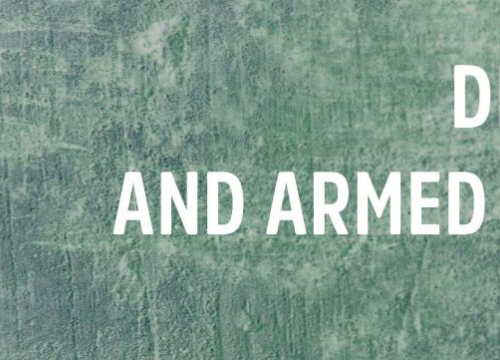Our New Publication Addresses the Devastating Impact of Conflict on Persons with Disabilities
7 May 2019
Our new publication Disability and Armed Conflict brings attention to the devastating impact conflict has on persons with disabilities and, crucially, highlights that many of the key international humanitarian law (IHL) provisions that serve to minimize the impact of armed conflict – such as the proportionality assessment and advanced effective warnings – are not being applied in a disability inclusive manner, resulting in persons with disabilities being killed, seriously injured or left behind as families flee armed attacks.
‘This publication brings attention to this extremely important, yet much overlooked topic that has been predominately ignored by states, humanitarian organizations, the United Nations (UN), civil society, the media as well as academics. It is the outcome of more than three years of research funded by SNIS and Pro Victimis, including field research in the Democratic Republic of the Congo, Colombia, Palestine, Ukraine and Vietnam’ underlines Professor Marco Sassòli, Director of the Geneva Academy.
The First Study on its Kind
Persons with disabilities are the largest minority group in the world. According to the World Health Organization, they represent at least 15 percent of every population. Despite this, and the severe consequences that armed conflict has on them, ‘disability’ is still widely considered a niche issue in the conflict setting.
‘Very little research or literature exists on the topic’ underlines Alice Priddy, former Senior Researcher at the Geneva Academy and author of the publication.
‘Open the contents page or index of any textbook on armed conflict and it is unlikely to include ‘disability’. Military manuals and IHL training programmes do not meaningfully incorporate the disability perspective while UN-mandated commissions of inquiry and UN agency reports routinely fail to include a disability analysis of armed conflict. Alarmingly, not a single resolution of the UN Security Council, Human Rights Council or General Assembly is dedicated to addressing the disproportionate impact of armed conflict on persons with disabilities’ she adds.
Key Findings and Recommendations to Apply IHL in a Disability Inclusive Manner
The publication offers eight key findings and recommendations for states, humanitarian organizations and the UN Committee on the Rights of Persons with Disabilities. The findings and associated recommendations relate to: the application of the UN Convention on the Rights of Persons with Disabilities (CRPD) in differing conflict settings, the relationship between the CRPD and IHL, as well as analysis of a number of key IHL norms, including adverse distinction and humane treatment from a disability perspective.
The findings also challenge the miss-conceptions that continue to dominate disability discourse: including incorrect understandings of ‘disability’, the under-inclusive focus on physical and sensory impairment, and prevention of primary impairment being wrongly included within disability-rights.
‘In sum, the publication highlights that IHL is not being applied in a disability inclusive manner and this amounts to discrimination under the CRPD and also goes against IHL’s own norms that demand humane treatment and prohibit adverse distinction’ stresses Alice Priddy.
Ensuring Concrete Changes on the Ground
Besides the recommendations offered in the publication, training sessions were held in Palestine, Ukraine and Vietnam, to provide stakeholders on the ground – local organizations of persons with disabilities, state representatives, UN agencies and other international humanitarian organizations – with an overview of international law applicable to persons with disabilities and their inclusion in norms related to the conduct of hostilities.
‘We plan to continue to work on this topic by publishing a Military Briefing in early 2020 that will offer very concrete guidance to militaries on the law and policy changes they need to make to ensure that they are applying their IHL obligations in an inclusive manner’ explains Professor Marco Sassòli.
A Photo Exhibition to Raise Awareness on this Issue
Determined to bring attention to the lives of persons with disabilities living in armed conflict, we have partnered with the photographer Giles Duley to tell the stories of some of those affected by armed conflict.
His photo exhibition on Quai Wilson (Geneva) from 30 Avril to 30 May 2019 tells the stories of persons with disabilities during and following armed conflicts including Odai in Gaza, Yasmine in Iraq, Betty in Uganda and Kholoud who fled Syria with her family and now lives in Holland after having spent almost three years in Lebanon.






